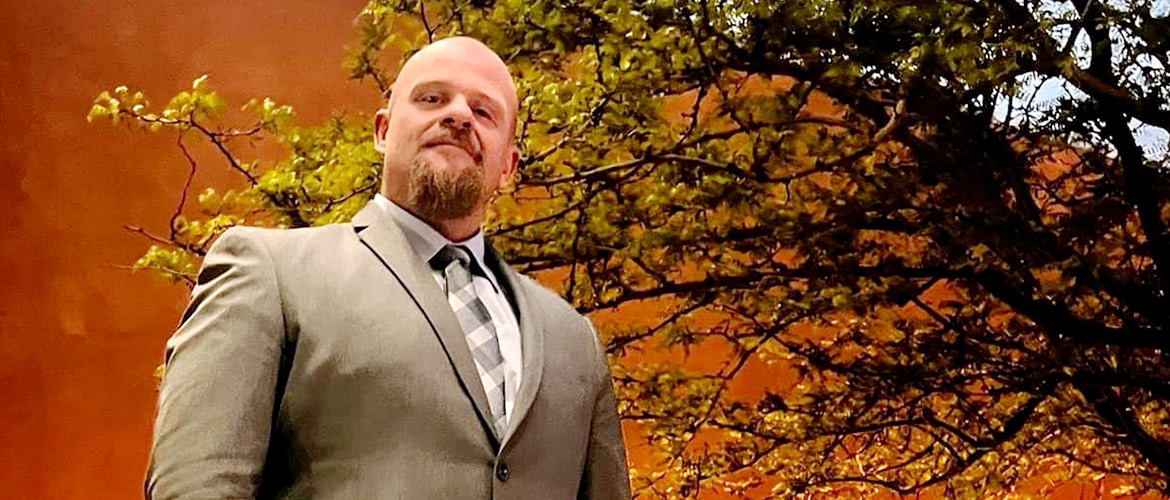In summer of 2021, Matthew Pettit faced up to seven years in prison for a federal drug crime when he got a break that changed his life.
During the pandemic, nonviolent offenders were released before sentencing to help stop the spread of COVID-19 in crowded jails with certain stipulations. For Pettit, that meant entering a sober treatment center for at least 30 days.
After two failed attempts at two different facilities, he arrived at New Mexico Wellness in Rio Rancho, an inpatient residential alcohol and drug treatment center.
“My plan was to run,” says Pettit, a Blue Cross and Blue Shield of New Mexico Centennial Medicaid member at that time. “But they made me feel like I was wanted there. I wasn’t used to that.”
Pettit embraced treatment and counseling, and staff asked him to stay as a peer leader and mentor new residents. Nearly six months later, he was referred to BCBSNM’s Transitional Living Services program and assigned a care coordinator to help him navigate his next steps. The program works with facilities like New Mexico Wellness and other community stakeholders to secure housing and treatment for Medicaid members with substance use disorder and/or severe mental health issues.
“I started to recognize that my lived experience and everything I had been through wasn’t for nothing."
In late December 2021, Pettit was enrolled in the program and moved into Endorphin Power Company, an Albuquerque-based transitional housing and addiction recovery facility. Early during his stay he landed a job, earned certification as a peer support worker. He also enrolled in Central New Mexico Community College and began volunteering at the Peace and Justice Center in Albuquerque.
“I started to recognize that my lived experience and everything I had been through wasn’t for nothing," he says. ”I could use it to help people going through similar experiences.”
Short-term housing
BCBSNM’s Transitional Living Services program launched in June 2016 to help eligible Medicaid members struggling with stable housing, substance use disorder and/or severe mental illness obtain short-term housing, behavioral health treatment and community resources.
The program collaborates with care coordinators, community providers, recovery support staff and other stakeholders to identify individuals like Pettit who may qualify. If approved, they’re referred to one of nine in-network providers, including Endorphin Power Company, where they can live for up to six months. Member progress is reviewed every 30 days, with an aim of graduating in 60-90 days.
“We do our best to support members around the state,” says Judy Madewell, BCBSNM supportive housing specialist who oversees the Transitional Living Services program. “Being unhoused has a huge impact as a social determinant of health factor. Without a roof over their head, behavioral health problems are exacerbated, and physical health is, too.”
The program’s overall goal is to improve health outcomes and reduce costs by increasing patient adherence to prescribed medications and avoiding unnecessary emergency department visits and hospital stays.
Between June 2016 and May 2023, the program enrolled nearly 140 members and produced successful results. For example, inpatient visits dropped 196% for behavioral health needs and 183% for non-behavioral health needs. Adherence to prescribed medication also increased.
These shifts contributed to overall savings of more than $300,000 in medical costs. But more importantly, members are being directed to appropriate care sites on their path toward recovery, says Madewell.
Setting goals
A key part of the Transitional Housing Services program is collaboration between BCBSNM care coordinators, living facilities and members.
Each program participant is assigned a care coordinator who completes a needs assessment to determine health care and housing needs and set a path toward recovery. Care coordinators also help members access community resources and navigate the health care system, including establishing regular primary care appointments.
“A care coordinator is your go-to for all community benefits in your area,” says Paul Condes, a BCBSNM care coordinator for 11 years who worked with Pettit. “We’re the central piece, the Blue access to all community resources.”
BCBSNM also works with care facilities that ensure their offerings are compatible with residents’ needs. For example, Endorphin Power Company’s current residents have an opportunity to meet prospective residents and vote whether to accept them.
“Recovery itself can look very different for people,” says Jeff Holland, executive director of Endorphin Power Company and part-owner of New Mexico Health and Wellness. “He (Pettit) did well at the treatment center and showed a lot of motivation to change — he was a model client.”
Looking ahead
Holland and Condes worked with Pettit until he graduated from Endorphin and the Transitional Living Services program in February 2023.
Reflecting on their time together, Condes says Pettit stood out during their initial meeting, and finds his journey inspirational.
“Seeing Matthew excel on his path toward his life goals and complete a full turnaround from where he was at is priceless,” Condes says.
Today, Pettit lives in Albuquerque and serves as program director of Best Chance, a non-profit re-entry center. He recently launched Healing Roar, an organization for individuals in recovery seeking an alternative to the traditional 12-step program.
His 5-7-year prison sentence was commuted to four years of probation that’s set to end in 2027. He’s been sober for more than three years and plans to graduate from Central New Mexico Community College in 2025 with a degree in human services and continue his career path as a drug counselor.
“I’m grateful for the opportunities and humbled by all the chances I’ve received,” he says. “The No. 1 thing that keeps me going is recognizing that there’s so much need for help, and that when I needed it, it was there for me. I’d like to pay that forward. So when someone else needs it, I’m there for them.”
MM_NMM33

